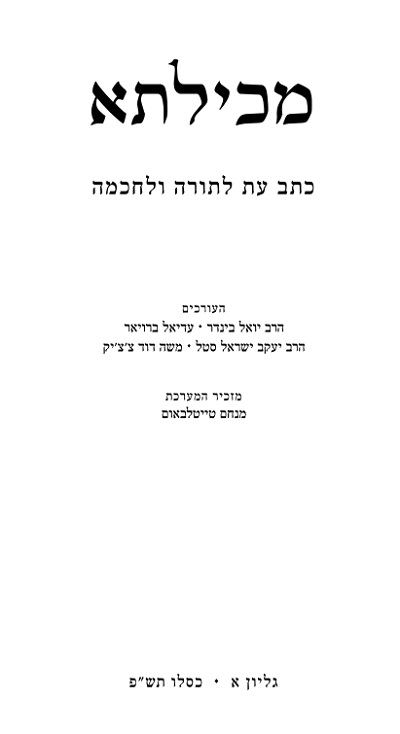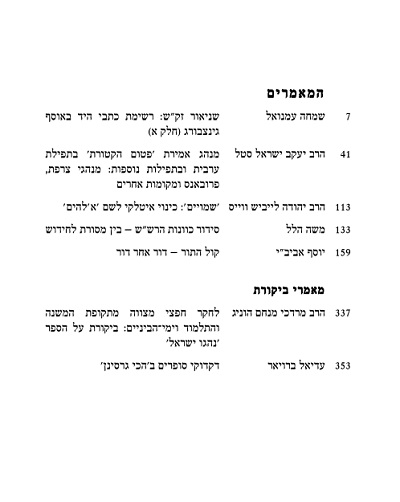New Journal Announcement: Mekhilta
New Journal Announcement
By Eliezer Brodt
מכילתא, כתב עת לתורה ולחכמה, ר‘ יואל בינדר, עדיאל ברויאר, יעקב ישראל סטל ומשה דוד צ‘צ‘יק (עורכים), גליון א, כסלו תש“פ, 364 עמודים
A new Journal just came out tonight called Mekhilta. The volume begins with their mission statement and will be published biannually.
The first issue has an all-star lineup of writers on great topics. Some of the writers are Professor Simcha Emanuel & Rabbi Yakov Stahl (on the Minhag of saying Pitum Haketoros); I have written about both of them in the past (here and here).
Some less familiar names are Rabbi Leibish Weiss, (see here for an article of his on the blog) and Rabbi Moshe Hillel. Readers might be familiar with Hillel’s various recent works (printed in limited editions) on some forged works, including Megilat Kuzin and Agudat Shmuel (on the strange Hagahot found in many editions of Rashi on Nach) or his excellent work Ohel Ram on the Gerer Rebbe’s seforim library.
Another article is authored by Rabbi Adiel Breuer on the Hachi Garsinan Talmud site. Rabbi Adiel is well known for his expertise and writings dealing with Geonica and Rishonim.
Another article worth a shout out is from an old friend Rabbi Mordechai Honig. In this article, Honig reviews another friend’s recent incredible work, Rabbi Yakov Stahl’s NaHagu BiYisroel on various Minhaghim related to the Daled Minim. The book draws on an extremely wide range of sources including archeological material and includes one hundred and seventeen pictures. [Copies of this work are still available for purchase.]
The longest article in this volume (178 pp.) is from Rabbi Yosef Avivi and deals with the authorship and authenticity of the famous work Kol HaTor attributed to the Gra. Avivi is famous for numerous masterpieces. Worth mentioning is his most recent four-volume work on Rav Kook where he demonstrated a new way to read R’ Kook (showing him to be even greater than he was thought to be up until now) and his very special three volume work mapping out the Arizal’s Kabbalah.
A few years ago, I heard from some friends that Avivi had an unpublished work on the subject of the Kol HaTor and I hoped that it would see the light of day. This work is included in this new journal. Academics and scholars have been debating this book heavily over the years; just a few months ago Professor Emanuel Etkes authored a work on the subject. It’s written in Avivi’s unique style and will surely generate discussion and debates just as his other works have done. Its timing is perfect as yet again the academic world is busy with the Gra this year as it’s the three hundredth year from his birth. I am aware of three conventions dedicated to him so far.
Copies of this volume are available for purchase through me (while the limited edition lasts) and will help support the efforts of the Seforim Blog. Contact me at Eliezerbrodt@gmail.com
Here is the Table of contents of the new journal.

